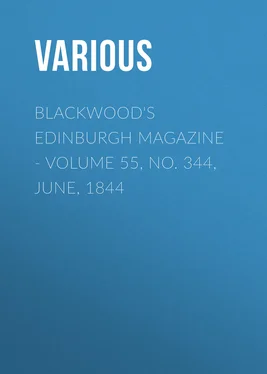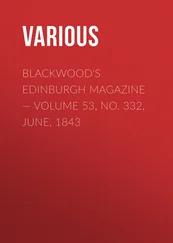Various - Blackwood's Edinburgh Magazine. Volume 55, No. 344, June, 1844
Здесь есть возможность читать онлайн «Various - Blackwood's Edinburgh Magazine. Volume 55, No. 344, June, 1844» — ознакомительный отрывок электронной книги совершенно бесплатно, а после прочтения отрывка купить полную версию. В некоторых случаях можно слушать аудио, скачать через торрент в формате fb2 и присутствует краткое содержание. Издательство: Иностранный паблик, Жанр: foreign_antique, periodic, foreign_edu, на английском языке. Описание произведения, (предисловие) а так же отзывы посетителей доступны на портале библиотеки ЛибКат.
- Название:Blackwood's Edinburgh Magazine. Volume 55, No. 344, June, 1844
- Автор:
- Издательство:Иностранный паблик
- Жанр:
- Год:неизвестен
- ISBN:нет данных
- Рейтинг книги:4 / 5. Голосов: 1
-
Избранное:Добавить в избранное
- Отзывы:
-
Ваша оценка:
- 80
- 1
- 2
- 3
- 4
- 5
Blackwood's Edinburgh Magazine. Volume 55, No. 344, June, 1844: краткое содержание, описание и аннотация
Предлагаем к чтению аннотацию, описание, краткое содержание или предисловие (зависит от того, что написал сам автор книги «Blackwood's Edinburgh Magazine. Volume 55, No. 344, June, 1844»). Если вы не нашли необходимую информацию о книге — напишите в комментариях, мы постараемся отыскать её.
Blackwood's Edinburgh Magazine. Volume 55, No. 344, June, 1844 — читать онлайн ознакомительный отрывок
Ниже представлен текст книги, разбитый по страницам. Система сохранения места последней прочитанной страницы, позволяет с удобством читать онлайн бесплатно книгу «Blackwood's Edinburgh Magazine. Volume 55, No. 344, June, 1844», без необходимости каждый раз заново искать на чём Вы остановились. Поставьте закладку, и сможете в любой момент перейти на страницу, на которой закончили чтение.
Интервал:
Закладка:
“It would have been strange indeed had such a maiden lacked suitors, or not very early found a sympathizing heart. Now, as for the suitors, there was no dearth of them, Heaven knows! for there were youngsters of the queerest fashion. Many without manners, though right well to look at; others wealthy, but without heart or soul; and others again ready to burst with rage, if any one but touched his hat to the beautiful Matilda. To all such, the innocent child had not a word to say; for she knew well enough, that scant blessing waits on marriages of such a make. There was but one young fellow who could be said to please her thoroughly, and he was neither rich nor singularly handsome. She had become acquainted with him at the weaver’s, where he, like herself, went daily to work. Albert was industrious, well-behaved, and spoke so sensibly and right-heartedly, that Maud ever listened to him with delight. Truth to tell, he simply put her own feelings into words. A very little time passed, before she engaged herself secretly to Albert; and all would have gone on happily and well with them, had the two lovers but possessed just money enough to scrape a few matters together, and to set up housekeeping. But both were poor—poor as church mice; and, just for that reason, the father of Maud did not look very favourably upon the settled love-affair of his daughter. He would have been better satisfied if the silly thing, as he called her, had given her hand to one of the rich suitors, who would have given their ears to please her. Since, however, once for all, the mischief was done, he, like a good man, determined to cause his only child no heartache, and let matters get on as they might. One condition only he insisted upon—which was, that Maud should for the future work under her father’s roof; Albert, meanwhile, having leave every evening to pay his visits there. In this arrangement the two lovers cordially acquiesced; for, young as they were, they could well afford a little waiting. Meantime, it must be their endeavour, by incessant labour and careful economy, to save up as much as they needed for setting themselves up in their humble dwelling. So they lived on from day to day in quiet content. And so, no doubt, many days, and many, would have glided by, had not a singular occurrence disturbed the profound tranquillity. This was the way of it:—
“Maud’s father, the stone-mason, found it too much for him, with his heavy work and all, when, at noon, he had the long journey to make between the stone quarry and his own home. Besides, the fine stone-dust had brought on an inflammation of the eyes, so that he was obliged to avoid the glare of the sun: no easy thing for him to do, since his road homeward lay over a green high hill, upon which the sun beat scorchingly: wherefore, also, the people have given it the name of the Sun’s hill. It was made, in consequence, Maud’s duty to take daily her father’s homely dinner to the stone quarry—a road which, although toilsome, was by no means disagreeable to her; inasmuch as Albert often found means to get leave of absence, and then always escorted her a part of the way.
“Over the Sun’s hill nobody went willingly alone, either by day or by night; for the tale ran, that to many persons wondrous things had happened. Some had even caught, they said, their death-sickness there. True it is, any more definite report was not easily obtained. Only so much had Maud heard from her mother, that the Good People were said, a very, very long time ago, to have vanished into the green hill; just when, in all the places around, so many churches had sprung up, and the sound of bells rang over mountain and wood. These reports notwithstanding, Maud, unconscious of evil, took her daily walk over the Sun’s hill, where indeed no one ever encountered her; so that the splendid landscape looked often desolate and awful in the hot midday’s glow. 14 14 “–his look Drew audience and attention, still as night Or Summer’s noontide air.”— Paradise Lost. Book II.
For this reason it was always a great relief to her, when, from the top of the steep hill, she saw Albert ascending towards her. She then felt herself more secure, and went with better spirits forward. It was near Whitsuntide—the father sickly and more peevish than ever, and work bringing in no supply; for provisions had risen fearfully in price in consequence of the previous unusually hard winter. Now, as often as Maud brought the dinner to her father, he complained bitterly, and reproached her harshly for her folly; so that the poor child was almost heartbroken, pined, and led a melancholy life.
“She most deeply felt her trouble, when at noon she took her lonely journey along the desolate path that led to the quarry. Then she often shed the bitterest tears, and prayed to God to show her an outlet, and to have pity on their poverty.
“One day—it was just a week to Whitsun-eve—it happened that as she went upon her way, silently and in sorrow, and in vain looked for the beloved figure of Albert, she suddenly heard such a marvellously clear sound of a bell that she stood still to hearken. It was upon the mid summit of the Sun’s hill; the air perfectly calm, and around, far and near, not a creature to be seen. From the distant hamlet in the valley clinked only the sharp tones of the whetting scythe. Maud believed that she had had a ringing in her ears, and walked on. The singular sound was repeated, resembling the tone exactly of a small silver bell.
“‘How strange it is!’ said the maiden to herself, casting her eyes upon the ground; and in the soft moss, right at her feet, she perceived something glistening like a fragment of blue glass. She stooped and picked up what in colour and shape resembled a blue harebell, or, as it is called, Fairy’s hat ; only, where the stalk should have been, there was a so small and elegantly-wrought little silver bell, that Maud could not help laughing outright.
“‘Bless me!’ she exclaimed, ‘who can have made that comical thing?’ and thereupon she shook the flower, and the wee little bell began to sound so prodigiously clear, that the poor damsel let it fall, affrighted.
“‘What are thy commands?’ asked immediately a slender bright voice. Before her stood a delicate creature, not higher than her hand; but of a symmetry of person that was perfectly astonishing. His small expressive head, round which a grove of curls, like crisped sunbeams, played, was just of a size, that the flower with the wondrous bell served it for a covering. For Maud saw how he put on the sparkling hat with much gravity, and at the same time, very knowingly, giving himself a right bold and dandy appearance.
“‘What are you then?’ asked Maud trembling.
“The little fellow made a smart bow, ‘Thy servant, with thy good leave,’ replied the strange being. ‘I and my people have known thee a long time. We have heard thy complainings; and because thou hast a kind heart, and lovest the flowers, and dost not wantonly pull them to pieces, am I charged to do thee a pleasure, provided thou wilt do the like for me and my people.’
“‘Indeed! you pretty little original!’ answered Maud, ‘who are thy people? I’–
“‘Hush!’ interrupted the little one, with a repelling gesture of the hand and a very impressive contraction of the brow. ‘These are questions which I cannot answer, and, what is more, cannot suffer. It is not civil to put questions of the whence and the what. If thou wilt trust me, and I should think that I have the air of a proper gentleman, then resolve without delay whether thou wilt do me a pleasure for a reasonable compensation.’
“‘Dear little sir!’ replied Maud, overcome, ‘I am not mistrustful, but so beset and afflicted that I really do not know how I am to understand this strange business. Do not make sport of me, good child; or, if thou art a spirit, I beseech thee have compassion on me, and let me go my way in peace. My father is waiting for me. His little bit of dinner is drying in the heat of the sun.’
Читать дальшеИнтервал:
Закладка:
Похожие книги на «Blackwood's Edinburgh Magazine. Volume 55, No. 344, June, 1844»
Представляем Вашему вниманию похожие книги на «Blackwood's Edinburgh Magazine. Volume 55, No. 344, June, 1844» списком для выбора. Мы отобрали схожую по названию и смыслу литературу в надежде предоставить читателям больше вариантов отыскать новые, интересные, ещё непрочитанные произведения.
Обсуждение, отзывы о книге «Blackwood's Edinburgh Magazine. Volume 55, No. 344, June, 1844» и просто собственные мнения читателей. Оставьте ваши комментарии, напишите, что Вы думаете о произведении, его смысле или главных героях. Укажите что конкретно понравилось, а что нет, и почему Вы так считаете.












